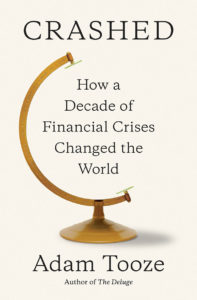Books
Looming Economic Collapse and Ways to Prepare; Historic Echos and Warnings
Published
3 years agoon

2008 and it’s Aftermath was a Wake Up Call that was Heeded by Virtually No-one
There are many good films on the economic collapse of 2008 (The Big Short is a favorite), also known as “The Great Recession” for fear of using the “D” word. Books too have opined on the lessons learned and, in some cases, taken dubious credit for the “rescue” of the world economy.
Read More: Conspiracy Theories are gaining adherents like never before: where’s the Reality?
Watched or read closely, these books, with the exclusion of the self-congratulatory ones mentioned above, all point to a sobering conclusion: the underlying issues that nearly led to a protracted worldwide economic collapse were not solved or fixed but “the can was simply kicked further down the road”.
Unfortunately, they also agree that “further down the road”, currently around 11 years later, translates to “soon”. Accordingly, we’d all be wise to revisit the 2008 crisis and read some of the conclusions, in detail, that have been drawn from a deeper study of the remaining and very serious issues faced as we go further forward into the 2020’s.
So much of our destinies are tied to economics, it is always a wise area to begin to look for solutions to all macro-dilemmas
Of course, now, in a crowded life-raft of a planet, we also have the rising threat of Climate Change, the ongoing and terrifying challenges associated with global pandemics and sociopolitical trends, that point towards anything but harmonious co-operation, within and between societies around the world.
All the more reason to embrace what at times appears to be the lone bright spot, in this saga of seemingly-endless doom and gloom: we have educational resources available and the modern marvel of human-networked-communication devices (a.k.a. the internet and the software and hardware we use to access it), is becoming a more powerful ally by the hour.
Here are books we highly recommend to start your journey towards your heroic contributions to finding solutions and hope, as we look to the future:
The Great Devaluation: How to Embrace, Prepare, and Profit from the Coming Global Monetary Reset
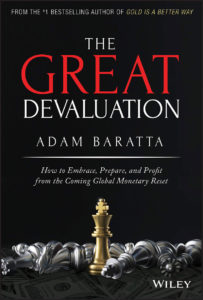
and help Independent Bookstores.
Also available on Amazon.
The Great Devaluation is the #1 bestselling book that explains why the real crisis facing the world today is not the Coronavirus. The real crisis facing the world is explosive government debt and deficits. Governments are now left with no choice but to spend more than they make, borrow more than they can ever repay, and devalue their currencies to cover it all up.
Former Hollywood storyteller Adam Baratta brings monetary policy to life in this follow-up to his national bestseller, Gold Is A Better Way. You’ll learn how and why Federal Reserve polices have facilitated an explosion in government debt and have systematically undermined the world financial system in the name of profit. The result? An out of control system where financial inequality has become a ticking time bomb set to blow up the global economy. Click here to see “The Great Devaluation” and help Independent Bookstores. Also available on Amazon.
Crashed: How a Decade of Financial Crises Changed the World
We live in a world where dramatic shifts in the domestic and global economy command the headlines, from rollbacks in US banking regulations to tariffs that may ignite international trade wars. But current events have deep roots, and the key to navigating today’s roiling policies lies in the events that started it all–the 2008 economic crisis and its aftermath.
Despite initial attempts to downplay the crisis as a local incident, what happened on Wall Street beginning in 2008 was, in fact, a dramatic caesura of global significance that spiraled around the world, from the financial markets of the UK and Europe to the factories and dockyards of Asia, the Middle East, and Latin America, forcing a rearrangement of global governance. With a historian’s eye for detail, connection, and consequence, Adam Tooze brings the story right up to today’s negotiations, actions, and threats–a much-needed perspective on a global catastrophe and its long-term consequences. Click here to see “Crashed” and help Independent Bookstores. Also available on Amazon.
Manias, Panics, and Crashes: A History of Financial Crises, Seventh Edition
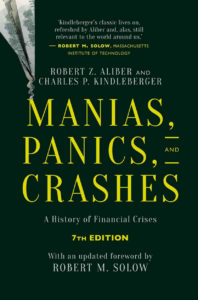
and help Independent Bookstores.
Also available on Amazon.
This seventh edition of an investment classic has been thoroughly revised and expanded following the latest crises to hit international markets. Renowned economist Robert Z. Aliber introduces the concept that global financial crises in recent years are not independent events, but symptomatic of an inherent instability in the international system.
Covering such topics as the history and anatomy of crises, speculative manias, and the lender of last resort, this book puts the turbulence of the financial world in perspective. Click here to see “Manias, Panics, and Crashes” and help Independent Bookstores. Also available on Amazon.
The Fed and Lehman Brothers: Setting the Record Straight on a Financial Disaster
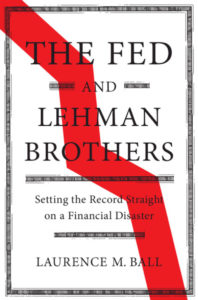
and help Independent Bookstores.
Also available on Amazon.
The bankruptcy of the investment bank Lehman Brothers was the pivotal event of the 2008 financial crisis and the Great Recession that followed. Ever since the bankruptcy, there has been heated debate about why the Federal Reserve did not rescue Lehman in the same way it rescued other financial institutions, such as Bear Stearns and AIG. The Fed’s leaders from that time, especially former Chairman Ben Bernanke, have strongly asserted that they lacked the legal authority to save Lehman because it did not have adequate collateral for the loan it needed to survive.
Based on a meticulous four-year study of the Lehman case, The Fed and Lehman Brothers debunks the official narrative of the crisis. It shows that in reality, the Fed could have rescued Lehman but officials chose not to because of political pressures and because they underestimated the damage that the bankruptcy would do to the economy. The compelling story of the Lehman collapse will interest anyone who cares about what caused the financial crisis, whether the leaders of the Federal Reserve have given accurate accounts of their actions, and how the Fed can prevent future financial disasters. Click here to see “The Fed and Lehman Brothers” and help Independent Bookstores. Also available on Amazon.
Too Big to Fail: The Inside Story of How Wall Street and Washington Fought to Save the Financial System–And Themselves
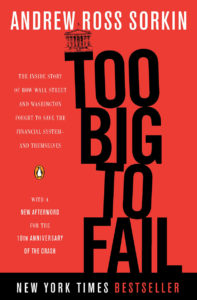
and help Independent Bookstores.
Also available on Amazon.
Brand New for 2018: an updated edition featuring a new afterword to mark the 10th anniversary of the financial crisis. The brilliantly reported New York Times bestseller that goes behind the scenes of the financial crisis on Wall Street and in Washington to give the definitive account of the crisis, the basis for the HBO film.
In one of the most gripping financial narratives in decades, Andrew Ross Sorkin–a New York Times columnist and one of the country’s most respected financial reporters–delivers the first definitive blow-by-blow account of the epochal economic crisis that brought the world to the brink. Through unprecedented access to the players involved, he re-creates all the drama and turmoil of these turbulent days, revealing never-before-disclosed details and recounting how, motivated as often by ego and greed as by fear and self-preservation, the most powerful men and women in finance and politics decided the fate of the world’s economy. Click here to see “Too Big to Fail” and help Independent Bookstores. Also available on Amazon.
Crash of 2008 and What It Means: The New Paradigm for Financial Markets
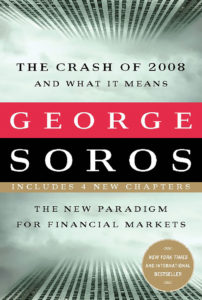
and help Independent Bookstores.
Also available on Amazon.
In the midst of one of the most serious financial upheavals since the Great Depression, George Soros, the legendary financier and philanthropist, writes about the origins of the crisis and proposes a set of policies that should be adopted to confront it.
Soros, whose breadth of experience in financial markets is unrivaled, places the crisis in the context of his decades of study of how individuals and institutions handle the boom and bust cycles that now dominate global economic activity. In a concise essay that combines practical insight with philosophical depth, Soros makes an invaluable contribution to our understanding of the great credit crisis and its implications for our nation and the world. Click here to see “The Crash of 2008 and What it Means” and help Independent Bookstores. Also available on Amazon.
Subscribe to our newsletter for all the latest updates directly to your inBox.
Find books on Economic Crisis, Politics, and many other topics at our sister site: Cherrybooks on Bookshop.org
Enjoy Lynxotic at Apple News on your iPhone, iPad or Mac.
Lynxotic may receive a small commission based on any purchases made by following links from this page.


